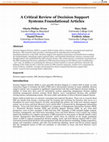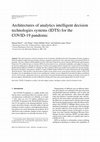Papers by Gloria Phillips-wren

Smart Innovation, Systems and Technologies, 2016
This book contains a collection of innovative chapters emanating from topics raised during the 5t... more This book contains a collection of innovative chapters emanating from topics raised during the 5th KES International Conference on Intelligent Decision Technologies (IDT), held during 2013 at Sesimbra, Portugal. The authors were invited to expand their original papers into a plethora of innovative chapters espousing IDT methodologies and applications. This book documents leading-edge contributions, representing advances in Knowledge-Based and Intelligent Information and Engineering System. It acknowledges that researchers recognize that society is familiar with modern Advanced Information Processing and increasingly expect richer IDT systems. Each chapter concentrates on the theory, design, development, implementation, testing or evaluation of IDT techniques or applications. Anyone that wants to work with IDT or simply process knowledge should consider reading one or more chapters and focus on their technique of choice. Most readers will benefit from reading additional chapters to access alternative technique that often represent alternative approaches. This book is suitable for anyone interested in or already working with IDT or Intelligent Decision Support Systems. It is also suitable for students and researchers seeking to learn more about modern Artificial Intelligence and Computational Intelligence techniques that support decision-making in modern computer systems.

Intelligent Decision Technologies, Apr 20, 2023
Artificial Intelligence research is presenting phenomenal progress in two directions: (i) new the... more Artificial Intelligence research is presenting phenomenal progress in two directions: (i) new theories and methodologies, and (ii) applications that expand traditional domains with innovative interventions. As indicated by recent reports, this progress has created a disequilibrium, where demand for scientists with skills in Artificial Intelligence is not fulfilled, a trend that will intensify further in the years to come. A potential solution to this shortage of specialised workforce may come from encouraging more women to get educated and follow a career in one of the Artificial Intelligence areas. This special collection of invited papers is dedicated to all women researchers and practitioners in Artificial Intelligence and coincides with the March 8, 2023 International Women's Day. Moreover, it has two specific goals: (i) to inspire more women to study and practice Artificial Intelligence through presentation of recognized women researchers who can act as role models, and (ii) to highlight some streamlined research areas of Artificial Intelligence.

Americas Conference on Information Systems, 2017
Decision Support Systems (DSS) is a mature field of study with an extensive conceptual and empiri... more Decision Support Systems (DSS) is a mature field of study with an extensive conceptual and empirical literature. This research study provides a starting point for learning and reviewing the foundation literature of the field. Decision support and analytics researchers can benefit from revisiting the methodologies, identifying under-explored ideas, and hopefully identifying visionary concepts from thought leaders who established the DSS research stream. This article reports a systematic examination of the DSS foundational literature published in MIS Quarterly during its first fifteen years of publication-1977-1991. In addition to examining the relevance of these articles to current and future research, the findings of the study provide a reference point for DSS research categories. Articles were categorized in terms of theory, methods, concepts and perspectives about computerized decision support that enrich research and encourage future exploration.
Springer eBooks, 2012
The use of general descriptive names, registered names, trademarks, service marks, etc. in this p... more The use of general descriptive names, registered names, trademarks, service marks, etc. in this publication does not imply, even in the absence of a specific statement, that such names are exempt from the relevant protective laws and regulations and therefore free for general use. While the advice and information in this book are believed to be true and accurate at the date of publication, neither the authors nor the editors nor the publisher can accept any legal responsibility for any errors or omissions that may be made. The publisher makes no warranty, express or implied, with respect to the material contained herein.
Lecture Notes in Computer Science, 2006
Information retrieval (IR) is challenging for a non-expert who operates in a technical area such ... more Information retrieval (IR) is challenging for a non-expert who operates in a technical area such as medical terminology. Since IR is essentially a decision making process, experience with the design of intelligent decision support systems is relevant. Intelligent agents can assist the user during decision making, and, by extension, in IR to locate the desired information. This paper presents an
IGI Global eBooks, Jan 18, 2011

International Journal of Information Technology and Decision Making, Nov 1, 2017
This research paper presents a novel complementary approach to the system implementation research... more This research paper presents a novel complementary approach to the system implementation research stream by comparing implementation success factors for management support systems (MSS), also called decision-making support systems, (DMSS) and management information systems (MIS). Data were collected over a 14-year period from 132 information technology (IT) practitioners from an industrialized region in Mexico and analyzed using exploratory factor analysis (EFA). While implementation success factors for MSS/DMSS and MIS have been studied previously, few comparative studies have been reported. Differences in implementation success factors between MSS/DMSS and MIS were found. Three clearly identified implementation success factors were found for MIS (i.e., project management, organizational feasibility and IT resources), and two factors emerged for MSS/DMSS with mixed items (i.e., system-organization-technical feasibility, and alignment between users, team, system and organization). The results indicate that achieving MSS/DMSS implementation success is more complex than for MIS. Although exploratory in nature, the comparative differences offer guidance to IT practitioners in implementing such systems and contribute to the MSS/DMSS literature with insights on implementation success factors that are unique to this type of IT system.

Intelligent Decision Technologies, 2022
This article presents a selective literature review of Analytics Intelligent Decision Technologie... more This article presents a selective literature review of Analytics Intelligent Decision Technologies Systems (Analytics IDTS) developed to support decision-making in business and public organizations, with a particular focus on the global COVID-19 pandemic. We select Analytics IDTS published in 2019–2020 and evaluate them with an Analytics IDTS Design and Evaluation Framework. We include the types of Analytics IDTS, their decisional services, architectural capabilities, and support for phases in the decision-making process. Results are shown for 33 articles in the general Analytics domain and 71 articles in the focused Public Health domain applied to COVID-19, including how these Analytics IDTS were architected and utilized for decision making. Research in descriptive and predictive models is evident in Public Health COVID-19 research reflecting the lak of knowledge about the disease, while predictive and prescriptive models are the primary focus of the general Analytics domain. IDTS ...

International Journal of Strategic Decision Sciences, 2016
The adoption of the Patient Protection and Affordable Care Act (PPACA) in 2010 with the intent to... more The adoption of the Patient Protection and Affordable Care Act (PPACA) in 2010 with the intent to improve the U.S. health care delivery system by expanding health insurance coverage and controlling health care costs has generated intense debate regarding its implementation. Marketplaces known as insurance exchanges have been established to provide coverage for Americans who otherwise could not get affordable health care benefits. These exchanges have been plagued with financial losses and other challenges leading to several large insurance providers discontinuing participation in the program. There are many possible remedies under consideration to make the program work better. This research seeks to support program evaluation as well as potential modifications to the law by providing baseline data to compare access and costs in states with state-based exchanges compared to states with federal exchanges. The authors perform an analysis by state for the years 2012 and 2013 (pre-PPACA ...
John Wiley & Sons, Ltd eBooks, Feb 18, 2013
Journal of Decision Systems, 2021
ABSTRACT This special JDS issue is focused on highlighting the new and updated decisional concept... more ABSTRACT This special JDS issue is focused on highlighting the new and updated decisional concepts, frameworks, methods, and technologies needed to assist decision makers and policymakers in the context of a global pandemic. This introductory editorial contains a brief overview of the eleven research articles provided by the international community.
Journal of Decision Systems

Journal of Decision Systems, 2019
Stressful environments encapsulate factors such as time pressure and information overload that ac... more Stressful environments encapsulate factors such as time pressure and information overload that act as inhibitors to intention to use decision aids. In this study, we investigate a stressful environment in a hospital and explore factors that are positively and negatively associated with the intention to use a decision aid. We then develop a theoretical model based on the literature and employ survey data from healthcare experts together with structural equation modelling to investigate the model. In addition to the expected factors from the Technology Acceptance Model, we uncover three additional constructs: information quality, perceived risk, and environment. Our analysis suggests that the perceived personal risk to the decision maker is positively related to attitude toward the decision aid, and that environment is an inhibitor and negatively related. Information quality was not significantly related in our analysis. We also uncover overconfidence bias as an inhibitor to intention to use decision aids.

Information Technology & People, 2019
Purpose Decision making is inherently stressful since the decision maker must choose between pote... more Purpose Decision making is inherently stressful since the decision maker must choose between potentially conflicting alternatives with unique hazards and uncertain outcomes. Whereas decision aids such as decision support systems (DSS) can be beneficial in stressful scenarios, decision makers sometimes misuse them during decision making, leading to suboptimal outcomes. The purpose of this paper is to investigate the relationship between stress, decision making and decision aid use. Design/methodology/approach The authors conduct an extensive multi-disciplinary review of decision making and DSS use through the lens of stress and examine how stress, as perceived by decision makers, impacts their use or misuse of DSS even when such aids can improve decision quality. Research questions examine underlying sources of stress in managerial decision making that influence decision quality, relationships between a decision maker’s perception of stress, DSS use/misuse, and decision quality, and ...
Project Risk Management, 2021
Intelligent Decision Technologies, 2022
IDT Journal lay in the fact that, while research mainly 21 focused on algorithms and technical sp... more IDT Journal lay in the fact that, while research mainly 21 focused on algorithms and technical specifications, the 22 technology was also becoming mature enough to be 23 implemented into real-world decision support systems 24 (DSS) for previously intractable problems.

The term ‘big data’ is used to describe data that are beyond the capabilities of an organization ... more The term ‘big data’ is used to describe data that are beyond the capabilities of an organization to store, analyze and use for accurate and timely decision making. They have alternately been described in terms of characteristics of volume, velocity, variety, veracity. We propose another characteristic of volatility for big data that should be considered in their use for decision making. We utilize a case study approach with a mid-sized company in the hospitality industry to elucidate challenges that an organization faces in developing a big data strategy and highlight research needed in this domain. Challenges identified were technical (inconsistent and unstandardized data, implementation and use of new analytics platforms, obtaining a global view of data, visualization of data, integrating mobile data), organizational (finding people with the right skills, users’ desire for customization), and strategic management (finding return on investment in big data, alignment of business and...

Advances in Analytics and Data Science, 2018
Our goal in this chapter is to demonstrate the operational benefits that can be gained by impleme... more Our goal in this chapter is to demonstrate the operational benefits that can be gained by implementing real-time, big data analytics in a healthcare setting and the concomitant influence of organizational culture on adoption of the technology. Benefits include improving the quality and accuracy of clinical decisions, processing health records efficiently, streamlining workflow, and improving patient satisfaction. We demonstrate these benefits by investigating patient-physician interactions in a large medical practice at WellSpan Health, and we compare the observed workflow with a modified one made possible with a big data, real-time analytics platform. By comparing these two states, we illuminate the lost opportunity and the value left on the table by legacy behaviors and processes. In addition, we uncover organizational characteristics that create a climate for cultural modification and initial acceptance of big data, real-time analytics in a change-resistant organization. The combination of academic research and practitioner implementation shows that optimization of clinical operations is a key first step toward gaining user acceptance of big data technologies.
The Routledge Companion to Risk, Crisis and Security in Business, 2018










Uploads
Papers by Gloria Phillips-wren